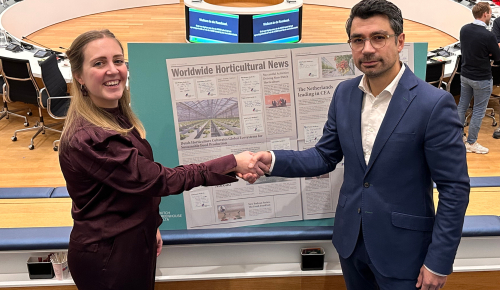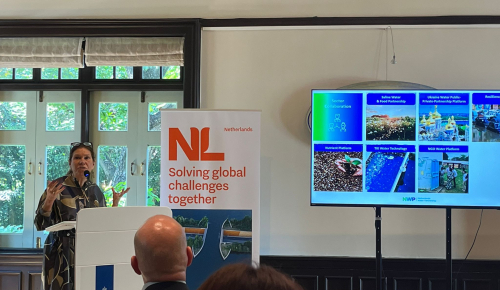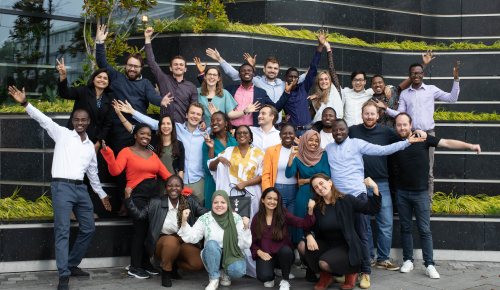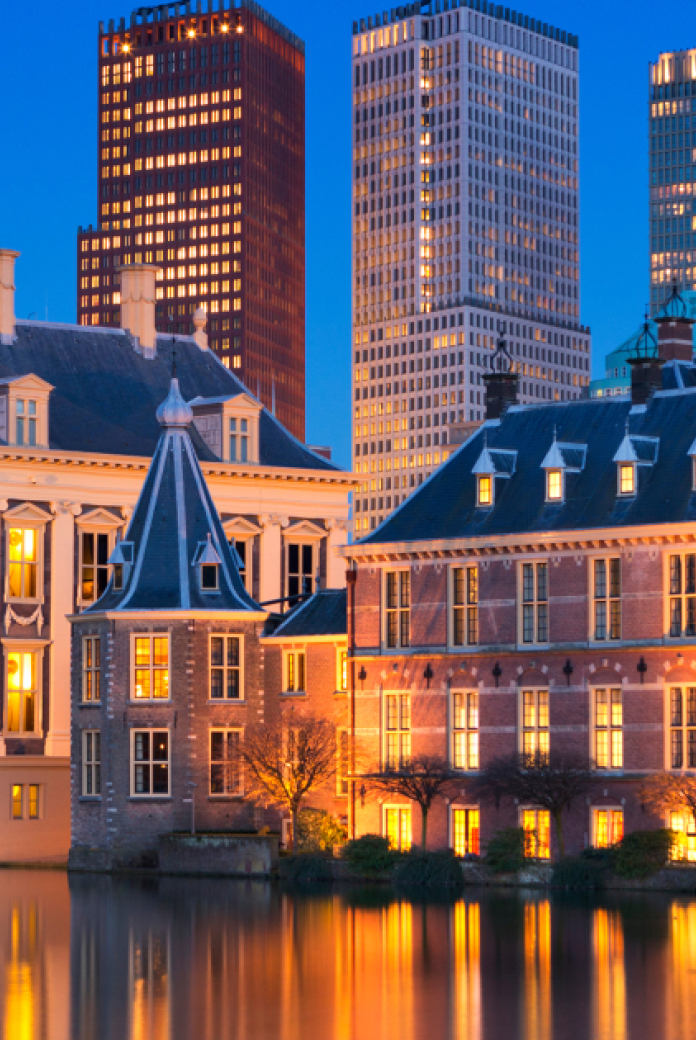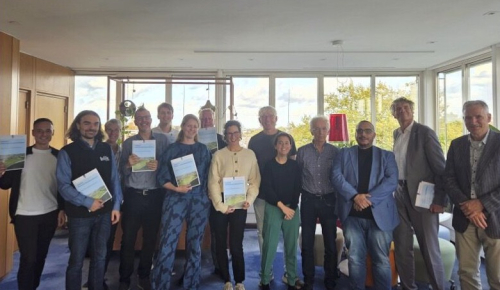Blog
19 December 2019COP25: Water adaptation and resilience, more mainstream than ever before
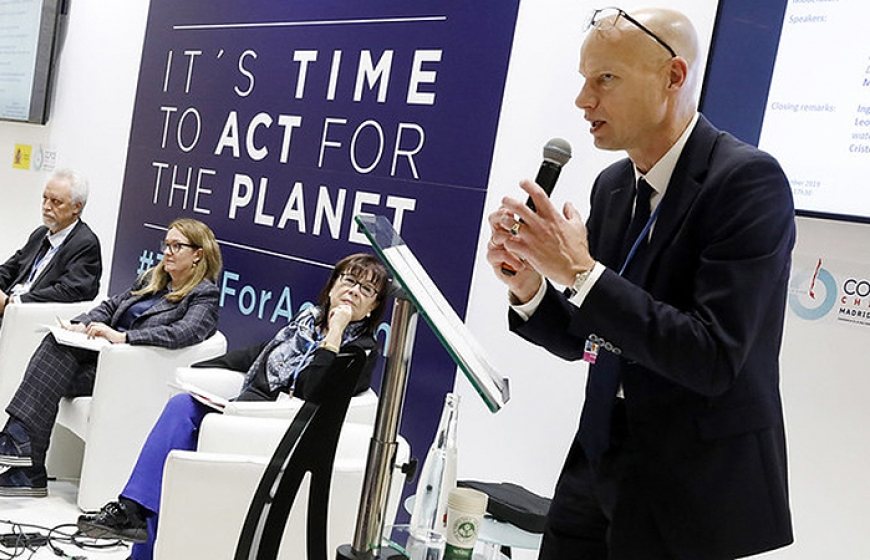
International media was not particularly exuberant about COP25 in Madrid. Only at the very last minute did a modest final statement emerge. At the next climate summit in Glasgow, five years after 'Paris', real progress has to be made. Nevertheless, the Dutch Special Envoy for International Water Affairs, Mr Henk Ovink, returned from Spain with a positive feeling. "I have never before experienced that the connection between water and climate adaptation was so high on the agenda and so omnipresent. This opens a window of opportunity to make impactful plans. And, more importantly, to implement those plans!"
‘I noticed in Madrid during COP25 that there is an increased awareness about the pivotal role of water and nature-based solutions in climate change, an increased awareness driven by our standard solutions and ations, and – as a result – more and bigger disasters with worse impacts. And since 90 percent of all disasters are water related, we all realise: water, nature-based solutions, adaptation, and resilience have to rise to the top of our agendas and actions. Next is how to mainstream this approach and these solutions so we can scale up our efforts and investments.
A well-organised chaotic mix of opportunities
I admit that no great progress was made at the central negotiating table in Madrid. But in various circles around that table, there was – as always – a dynamic and well-organised chaotic mix of opportunities to meet people and join sessions of all kinds where countries, NGOs, companies, and financial institutions conferred both formally and informally. It was good to be part of it and witness first-hand their expertise, experience, and commitments and the dynamics it produced. There is more than ever a great sense of urgency; people and organisations are highly motivated to work together, to really do better together, and to achieve results.
Parallel worlds
Two parallel worlds: climate negotiations and climate conversations. Both determined to spark best actions and forge partnerships, but one stuck in old politics and the other with two feet on the ground, in the real world, with real suffering and real opportunities.
The parallel world consists of a broad range of conversations, actions, and protests, both formal and informal or somewhere in between. The Marrakech Partnership for Global Climate Action is a nice example of a formal initiative that arose from an informal conversation. This partnership supports the implementation of the Paris Agreement by enabling collaboration between governments and the cities, regions, businesses, and investors that must act on climate change.
Water as connector and solution
Nationally determined contributions (NDCs) are at the heart of the Paris Agreement and the instruments to achieve these long-term goals. The Netherlands is a co-chair of the NDC Partnership. The Global Water Partnership (GWP) and the independent, global think tank Overseas Development Institute (ODI) presented their report 'The Untold Story of Water in Climate Adaptation – Part II: 15 Countries Speak'. It is based on an in-depth analysis of 15 countries, examining whether and how their NDCs and National Adaptation Plans (NAPs) build climate resilience through work on water issues. The report states that water is the connector and therefore the solution, yet our fragmented approaches and fragmented institutional reality prevent us from doubling down on this opportunity.
The Netherlands presented – on the international stage – its new Dutch Fund for Climate and Development (DFCD). “Through the DFCD, locally identified NGOs and communities will build bridges with the world of finance. The fund will endeavor an optimistic approach from good to great”, said Sigrid Kaag, Dutch Minister for Development Cooperation, at the launch in Madrid.
And with the Global Commission on Adaptation Meeting, it was clear that adaptation is front and center to combat climate change impacts while working on emission reductions and keeping our temperature rise below the limits we set in Paris in 2015.
At the Climate and Development Day, Saleem Huq, its founding father, again made clear that the world is on a track to climate destruction. Only if we include all, starting with the most vulnerable, and scale up climate actions and investments, leaving no one behind, will we manage to catch up.
And in this dynamic, it was great to work and engage with the young leaders of the world through the Water Youth Network. They again brought an inspiring and amazing group of young water leaders to these debates, both influencing the negotiations through their networks and positions and ratcheting up ambitions to the levels we need.
No time to waste
They and we all know we can and will never stop our continuous work toward further progress; we are not going to wait for Glasgow. There is no time to waste if we want to achieve our climate and sustainable development goals and thus safeguard our planet and our future. For this, we need big and small successes. Therefore, it was great to come to COP25 with good news about the very inspiring City of 1000 Tanks project in Chennai, India, part of our Water as Leverage Asia programme. City of 1000 Tanks intends to develop a Water Balance Model across the city by collecting rainwater, treating waste water and runoff pollution with decentralised nature-based solutions, and by recharging these to the underground aquifer. This will reduce the CO2 footprint, mitigate stormwater flooding and heat island effects, and build climate awareness with lower costs in investments and in maintenance and operations. This will be the pilot, a miniature version of the full neighbourhood project ¬– financed by local, Dutch, and German funds – to showcase how it works and build awareness and capacity as a run-up to the larger community-scale project to be financed by the Green Climate Fund.
Pick up the gauntlet
The Dutch water approach and our Dutch water sector can play a critical and valuable role in meeting the immense water and climate challenges. We are known as an inspiring, reliable, and strong convening partner. Our transparent and inclusive approach fits exactly with the UN motto 'Leaving No One Behind' for achieving the sustainable development goals. And our long-term and integrated programmatic approach helps tie together the SDGs and the Paris Agreement. We know what to do, we must only do it better, bolder, bigger, and with everyone everywhere. That is the gauntlet that we must pick up in 2020!’
